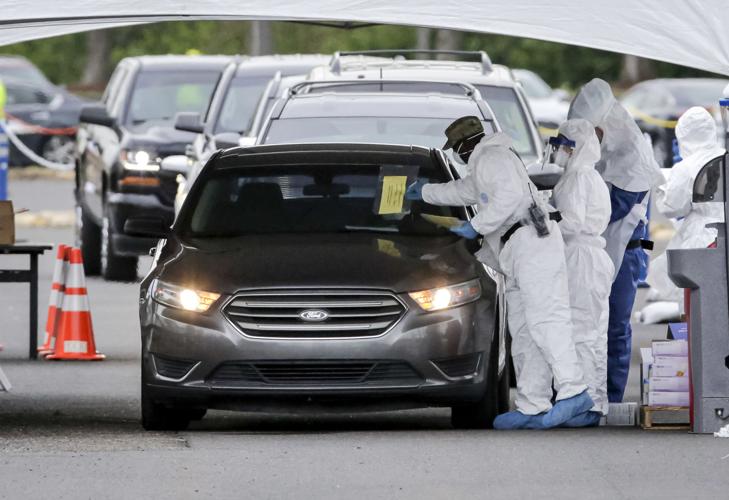As the pace and availability of coronavirus testing in Louisiana accelerates, the numbers of cases and deaths have begun to grow rapidly, according to Louisiana Department of Health data that showed 763 known cases and 20 deaths as of Saturday evening.
The number of known cases was up by 42% from Friday. And while the majority of known cases are still in the New Orleans metro area, the virus appears to be spreading across the state, with 35 of Louisiana's 64 parishes — including many rural ones — now reporting known cases.
Much of the increase is due to the huge jump in the number of tests processed in recent days as commercial testing has ramped up. Saturday marked the first day when the number of private tests outpaced those done by the state. Just over 2,000 tests have now been reported by commercial labs, while the state's lab, which was the sole test provider in Louisiana through much of the outbreak, has completed 1,294 since testing began.
A medical staffer at the New Orleans jail has tested positive for the novel coronavirus, officials confirmed Saturday, underscoring inmates’ f…
Before Friday, the LDH had only reported the number of tests processed by the state’s lab, though LDH did include positive tests performed by private labs. Until recently, the number of private tests in Louisiana was negligible.
Of the known cases in Louisiana, about 55% are in Orleans Parish, and another 22% percent are in neighboring Jefferson Parish, meaning that the center of the outbreak in Louisiana remains New Orleans, where the death toll now stands at 15. That number includes six deaths at Lambeth House, the senior-living complex in Uptown New Orleans.
East Baton Rouge Parish, the largest parish in the state by population, now has 18 known cases. Lafayette Parish has six.
Earlier this week, the New Orleans distillery Porchjam was making its Bolden Vodka, while nearby the firm GoodWood NOLA was milling oak planks…
The jump in cases Saturday comes as Gov. John Bel Edwards and other public officials have taken increasingly drastic steps to try and stem the spread of the virus. During press conferences this week, Edwards has warned that despite the efforts of the public to avoid large gatherings and practice "social distancing," the number of cases is all but certain to keep rising as more people are tested.
As private testing has grown, the proportion of Louisiana tests returning a positive result has started to fall. The rate, as of Saturday evening, was 23%. In the early days of the virus, the number had been averaging around 35% in Louisiana.
The high rate of positive tests early on was partly a reflection of the fact that tests, because of their scarcity, were primarily being given to people who were severely ill. The threshold for a test has been reduced with broader availability of testing kits.
The new data show that of 1,371 tests tallied since Friday evening, about 16% were positive.
More people are expected to have access to tests in coming days. New Orleans and Jefferson Parish officials announced Saturday they were expanding coronavirus testing to the general public at three drive-through testing sites in the area. Testing at those sites had initially been restricted to first responders and health-care personnel.
Beginning Sunday, any individual with a fever and other symptoms can be tested at the two New Orleans sites, in the Mahalia Jackson Theater parking lot and the parking lot at the University of New Orleans’ Lakefront Arena. Up to 250 people can be tested each day.
Lines are open daily.
Jefferson Parish announced its drive-through testing center at the Alario Center in Westwego would be available starting Saturday to members of the public showing symptoms, with a limit of 250 tests per day.
All three sites are open 8 a.m.-6 p.m. daily or until their test limits have been reached. The tests are free. People who want to be screened will be tested for fever. Results will be available by phone in three to five days.
Meanwhile, the health department also loosened its coronavirus testing criteria on Saturday, dropping a requirement that patients first test negative for the flu. That requirement had been put in place amid a serious shortage of coronavirus tests and was aimed at determining whether symptoms were caused by the flu instead.
People seeking a coronavirus test will still need to show symptoms of illness — including a fever over 100.4 degrees — but won't need to have tests done to rule out the flu first, said Kevin Litten, an LDH spokesman.







